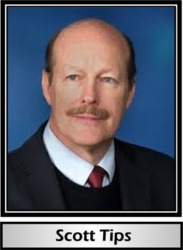Editor’s Note: This article is intended for information purposes only. Because state and municipal laws vary greatly, as do the circumstances of individual cases, readers are advised to contact an attorney for specific legal advice. © Scott C. Tips 2019
Many decades ago, during the New Deal era, the United States Supreme Court decided in the Valentine v. Chrestensen case that commercial speech was not entitled to the same degree of protection under the First Amendment as political speech. The Court held that while the distribution of noncommercial handbills was entitled to First-Amendment protection, the similar distribution of commercial handbills was not. The latter could be regulated by any two-bit government branch or agency with a thirst for control and power while the former could not.
For the next 34 years, or until the Supreme Court once again took up the issue in the 1976 case styled as Virginia State Board of Pharmacy v. Virginia Citizens Consumer Council, Inc., the American court system allowed regulatory agencies to run roughshod over businesses and their advertising. Bureaucrats dictated—and still dictate today—what businesses may say about their products or services, regardless of whether the statements are true or not. Commercial speech, you see, is a lower form of life in the government’s eyes than political speech. And commercial speech isn’t just about businesses but also encompasses licensed professionals, such as pharmacists, doctors, veterinarians, nurses, and, yes, even lawyers.
With the Virginia State Board of Pharmacy case, though, the Supreme Court struck down a State law banning prescription-drug advertising. “Advertising, however tasteless and excessive it sometimes may seem,” the Court stated, “is nonetheless dissemination of information as to who is producing and selling what product, for what reason, and at what price.” And as Martin H. Redish commented in his Cato white paper Commercial Speech and the Values of Free Expression (No. 813) many years later, “A commitment to free expression both reflects and implements a belief in the ability of adult individuals to judge for themselves the wisdom or persuasiveness of competing viewpoints.”
Subsequent commercial free speech cases have only built upon the broadening protection afforded to that business vein of free expression. The courts, and the Supreme Court especially, are slowly recognizing that businesses are entitled to express their truthful views as well under the same First-Amendment umbrella as other speech. Redish again clearly makes the case for abolition of this differential treatment when he argues, “People are either sheep, or they are not: if they cannot be trusted to make the ‘correct’ commercial purchasing decision on the basis of free and open debate, how can they logically be trusted to make political choices on the basis of such debate?”
Speech by Licensed Professionals
Almost nowhere else has the burden been as heavy as upon licensed professionals such as doctors, lawyers, pharmacists, nurses, and beauticians. In 1950, only one in twenty workers required government permission to practice an occupation. Today, it is one in five. Plus, when licensed workers move across State lines, they are additionally burdened because they must get relicensed (except in Arizona, which just this year has become the first State in the Nation to recognize all other State licenses).
Yet the real burden upon licensed professionals is often what they may say and do within their professions. Under the two-pronged, commercial-versus-political free-speech approach taken by the courts, States and other governmental bodies have not been shy about regulating what these professionals may or may not do. For example, years ago, it was expressly forbidden by State Bar codes of professional conduct for an attorney to even advertise. States have also prohibited doctors and veterinarians from giving advice over the internet.
Online Practice by Licensed Professionals
The main justification behind the prohibition against online medical or veterinarian advice has been that the doctor must always first see the patient in person in order to give competent advice. But experience has disproven that as an ironclad rule as there are many occasions where competent advice can still be provided to or for a patient through online contact. Advances in technology have accelerated the advent of Artificial Intelligence and mobile-phone-based consultations, particularly in remote or hard-to-access areas and might soon even render in-office visits a thing of the past.
Still, the old rules persist. Dr. Ron Hines is a Texas veterinarian with 40 years of experience who retired in 2002 but figured out a way to keep helping animals in need of medical attention. He created a website (www.2ndchance.info) through which he would give animal owners the benefit of his experience. Dr. Hines gave advice worldwide for a fraction of the cost a normal vet would charge.
Keep in mind that many of his customers either could not afford to go to a veterinarian to seek help for their pet or else were in such remote areas that there were no vets available to help. Hines was providing a valuable service and one that helped a lot of animals and their owners.
Sadly, though, the State of Texas did not see the value there. Texas is one of those States that requires a practicing veterinarian to hands-on examine the animal (or the place where the animal is kept) before he or she can give advice for treating that animal’s condition. So, without a single consumer complaint in hand, in 2012, the Texas State Board of Veterinary Medical Examiners (TBVME) fined Hines, shut down his online practice, and suspended his license for one year.
With the economic-freedom-fighting organization Institute for Justice as his legal team, in early 2013, Hines filed a lawsuit in Federal court against the TBVME, alleging that his free-speech rights under the U.S. Constitution had been infringed. The district court found that Dr. Hines might have a First-Amendment claim. However, the Fifth Circuit Court of Appeals ruled against Hines, rejecting his claims and saying that Hines’ advice was part of an “occupation” and therefore not protected under the First Amendment. Unfortunately, in December 2015, the U.S. Supreme Court refused to review the case and that appeared to be the end of the road for Hines.
Fortunately for Hines, though, the Institute for Justice tenaciously launched a series of lawsuits across the country on this right. In one such case, NIFLA v. Becerra, the U.S. Supreme Court held in June 2018 that a California law forcing pro-life pregnancy centers to notify clients about the State’s abortion services violated their free-speech rights and that the speech of licensed professionals is protected by the First Amendment. The Court further ruled that States may not censor professionals without a compelling reason.
Later that same year, riding on the coattails of the NIFLA decision, Hines filed a second lawsuit against the TBVME alleging that his free-speech rights had been violated. This second case is still pending. However, even Texas must see the handwriting on the wall because in 2017 the State began allowing doctors to give online advice. It would be hard for the Texas attorney general to argue against Hines when it is already allowing online medical advice for doctors. Look for a change in TBVME rules here or else a hard fall by Texas in this second Hines lawsuit.
So, What’s the Point?
The U.S. Supreme Court decision in NIFLA last year has opened the floodgates for virtually all licensed practitioners to be able to provide online advice. Some States such as Washington, perhaps more enlightened in this area than Texas, have been allowing telemedical advice for many years now.
But the application of this court ruling transcends all occupational boundaries here. Licensed nutritional therapists, optometrists, pharmacists, and other professions that have any sort of prohibitions against providing online advice will benefit. This is not just about doctors or veterinarians, it encompasses very much more and where it will stop is anyone’s guess at this point.
Frankly, the day will arrive where further litigation (and not legislation) may very well result in a true freedom for dietary-supplement and other such businesses to be able to make the truthful and non-misleading claims that they should always have been able to make, without the heavy and deadening hand of the FDA and other agencies to stifle them. Ultimately, the right to free speech is every bit as much about the people’s right to hear and know as it is about someone’s right to speak and be heard.Editor’s Note: This article is intended for information purposes only. Because state and municipal laws vary greatly, as do the circumstances of individual cases, readers are advised to contact an attorney for specific legal advice. © Scott C. Tips 2019
Note: The views and opinions expressed here are those of the author(s) and contributor(s) and do not necessarily reflect those of the publisher and editors of WholeFoods Magazine.

NY Age-Restriction Law Takes Effect
April 22, 2024









